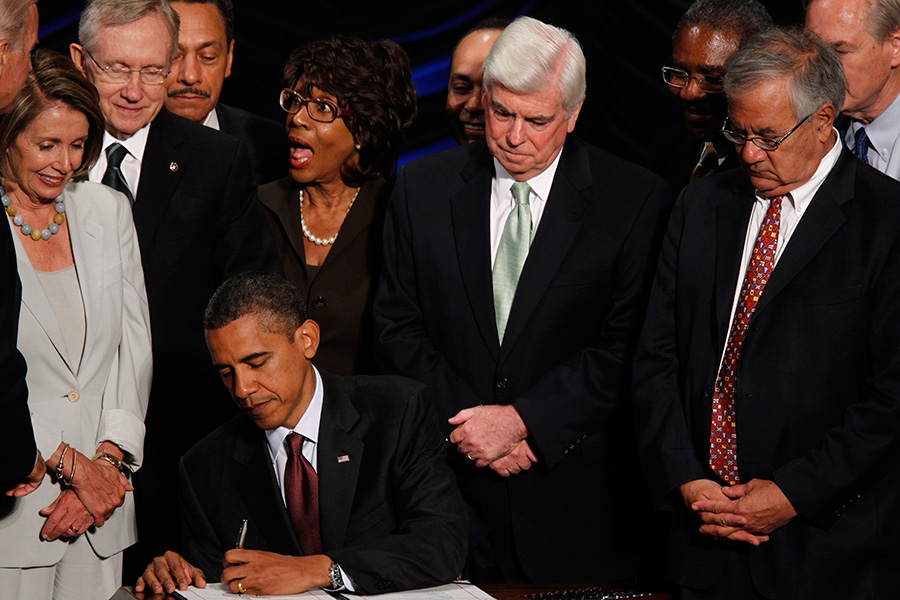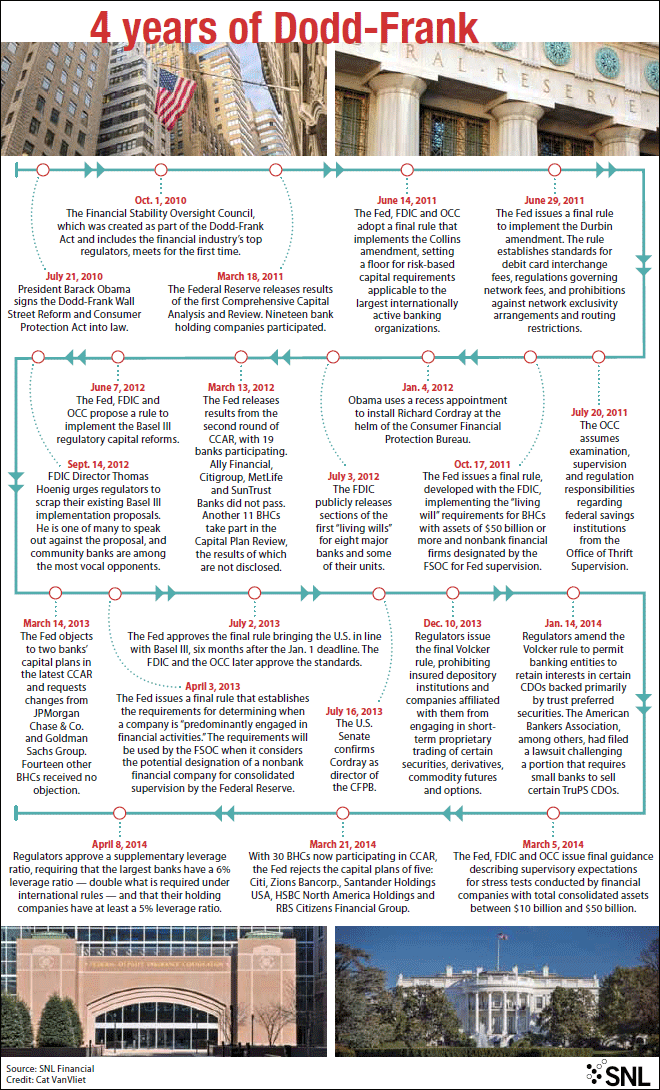It was just four short years ago today that President Barack Obama signed the Dodd-Frank Wall Street Reform and Consumer Protection Act of 2010 into law.
The Act was celebrated as a savior to our financial system and signed with great fanfare on July 21, 2010. As President Obama signed the Act into law, he was flanked by Sen. Christopher Dodd and Rep. Barney Frank, the Act’s co-sponsors and namesakes.
Next to Dodd stood Rep. Maxine Waters, Sen. Harry Reid and Rep. Nancy Pelosi. Behind them stood Rep. Mel Watt, who is now the Director of the Federal Housing Finance Agency.
In the four years since July 21, 2010, the financial system in this country has undergone immense changes, but has Dodd-Frank fulfilled its promise?
Not so much, according to a report from SNL Financial.
In a report titled “Dodd-Frank: Behind schedule and under scrutiny,” SNL analysts J. Daniel Young and Jasmine Castroverde write that a great deal of the Dodd-Frank Act’s rulemaking requirements have not yet been proposed and even more of the proposal deadlines have passed without action.
“As a Davis Polk & Wardwell LLP progress report on the legislation indicates, the deadlines for 280 rulemaking requirements have passed, as of July 18,” the analysts write. “Of those, 127 deadlines were missed. Of the 398 total required rulemakings contained in the bill, 96 have yet to be proposed.”
Click the image below for a recap of the last four years of Dodd-Frank.
While many of the features of Dodd-Frank have been established, it’s not without controversy.
Dodd-Frank was initially thought of as a driver of housing recovery and improvement, but mortgage applications are shaping up to fall below 2013's level in 2014.
In a recent note to clients, KBW Research says that they expect for modestly stronger mortgage origination volumes in the second quarter of 2014 versus the first quarter, although still down meaningfully year-over-year.
“We are making modest alterations to our estimates based on the early read-across from other mortgage banking results, as well as reported data for the title insurers. We are also cutting our estimates for servicers to build in somewhat higher costs,” the report says. “We estimate that 2Q14 mortgage volume will come in at roughly $275 billion. This is in line with the Mortgage Bankers Association, although it is lower than Fannie Mae and Freddie Mac estimates."
One of the key Dodd-Frank initiatives was the creation of the Consumer Financial Protection Bureau, which has been the topic of significant scrutiny in the halls of Congress.
Last month, the director of the CFPB, Richard Cordray, underwent intense questioning by the House Financial Services Committee.
Majority Republican members accused the agency of the worst kinds of operational and financial mismanagement — collecting private personal data on U.S. citizens, being non-transparent and developing a culture of discrimination at the CFPB. Also in the mix was the now $185 million renovation the CFPB is undertaking on an office building it does not own, a renovation that costs more than the actual building itself.
House Financial Services Committee Chairman Jeb Hensarling, R-Texas, launched the opening salvo.
“Properly designed, the CFPB is capable of great good on behalf of consumers. It is also capable of great harm,” Hensarling said. “In just three years, the CFPB has grown into an unaccountable federal leviathan of nearly 1,400 employees with over a half billion dollar budget and the unrestrained power to dictate which Americans can receive credit and which Americas cannot. Knowledgeable Americas are rightfully alarmed as the threat and the harm begins to mount.”
The CFPB has also come under fire lately for the amount it’s spending on the renovations for its offices.
Republicans argued that the CFPB is spending much more per square foot than it cost to build the Trump World Tower ($334/square foot) or the Burj Khalifa in Dubai ($450/square foot), according to congressional leaders critical of the CFPB’s unchecked spending.
And last week, a new CFPB proposal to make unvetted complaints from consumers available to the public was met with concern by several financial institutions.
Under the CFPB’s proposal, when consumers submit a complaint to the regulatory bureau, they would have the option to share their account of what happened in the CFPB’s public-facing Consumer Complaint Database.
The Mortgage Bankers Association and the National Association of Federal Credit Unions say they believe making the CFPB’s consumer complaint database public wouldn’t serve consumers or financial institutions.
Another of Dodd-Frank’s most significant features was the establishment of the Financial Stability Oversight Council. When Treasury Secretary Jacob Lew testified before the House Financial Services Community in June, Republicans again questioned the efficacy of Dodd-Frank.
Lew faced a challenging crowd in the Republican-controlled committee, which passed several bills last week to overhaul the FSOC, including a bill that would put a six-month moratorium on the FSOC's ability to designate nonbank firms as systemically important financial institutions. The SIFI designation brings supervision from the Fed.
This could have direct impact on nonbanks handling MSRS like Ocwen Financial Services (OCN), Nationstar (NSM), and Walter Investment Management (WAC), should they be designated SIFIs. These nonbanks are already facing regulatory scrutiny, and analysts question whether more is needed.
The impact of nonbanks was also questioned by the FHFA’s Office of the Inspector General last week. The FHFA-OIG cited three increased risks for Fannie Mae and Freddie Mac posed by nonbanks: elevated counterparty credit risks, elevated operational risks and elevated reputational risks.
Additionally, the Dodd-Frank’s Volcker Rule, which prohibits U.S. bank holding companies and their affiliates from engaging in "proprietary trading" and from sponsoring hedge funds and private equity funds, is thought of by some as a “job killer.”
Again, the House Financial Services Committee questioned the Volcker Rule, this time in January. As HousingWire’s Trey Garrison wrote at the time, capturing the tone of testimony before the committee:
The Volcker Rule will stifle job creation at a critical time for the economy because it impairs liquidity, reduces access to credit, restricts trading for banks with a special impact on community banks, and, most damningly, means small and start up businesses – the key job creators – receive less access to critical capital.
SNL’s analysts spoke with other industry observers who questioned whether Dodd-Frank was even necessary.
Hester Peirce, a senior fellow at the Mercatus Center at George Mason University, told SNL that the power and authority delegated to regulators as a result of Dodd-Frank was the opposite of what should have been done. She contends that the market should hold itself accountable. "If you could replace all the regulations we've done and just have higher capital, you'd have a safer system," she said.
Similarly, attorney Oliver Ireland at Morrison & Foerster said the costs of Dodd-Frank "significantly outweigh the benefits in terms of overall financial stability." He added, "We are looking at a huge piece of legislation, imposing a lot of costs and a lot of changes in the system and it's not clear what the benefits are."
And with so much yet to materialize, the effects of Dodd-Frank are still unknowable, according to Ireland. "The effective dates tend to be off into the future and you don't really see the effects of them until after the effective date," he said. "We are a ways off from seeing what the post-Dodd-Frank financial system looks like."
Take a look at this picture. That’s from 4 years ago today. There was so much hope for the future in this picture.

No one can argue that Dodd-Frank hasn’t changed our financial system, but it’s doubtful that anyone in this picture was thinking that there would be so much more work still left to be done.
Hopefully four years from now, we’ll feel a little better about Dodd-Frank than we do right now. In the meantime, happy birthday to you, Dodd-Frank. Blow out the candles and make a wish.




